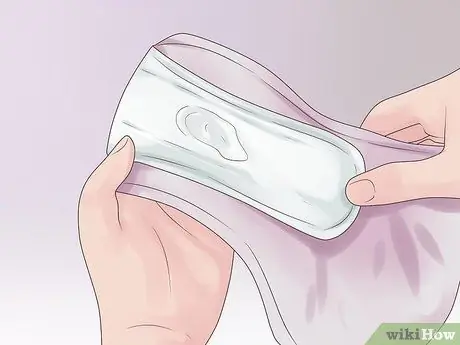- Author Jason Gerald gerald@how-what-advice.com.
- Public 2023-12-16 10:50.
- Last modified 2025-01-23 12:04.
Bacterial vaginosis (BV) is a vaginal infection caused by a disturbance in the balance of "good" and "bad" bacteria that live in the vagina. BV is very common, especially in women of childbearing age. Most women develop BV at a certain age. Although not life-threatening, BV can cause dangerous complications if not treated properly. Begin reading Step 1 below to learn how to detect, treat, and prevent BV.
Step
Part 1 of 2: Studying Symptoms

Step 1. Watch out for abnormal vaginal discharge
BV is often characterized by watery vaginal discharge that is gray or white in color.

Step 2. Watch out for vaginal discharge that smells bad
BV also often causes vaginal discharge to have an unpleasant or fishy odor, which gets worse after sexual intercourse.

Step 3. Be aware of the burning sensation while urinating
Although usually painless, in some cases, BV causes a burning sensation when urinating.

Step 4. Watch out for vaginal itching
BV can cause mild itching on the outside of the vagina, which can get worse when the area is cleaned with soap.

Step 5. Remember, BV sometimes doesn't cause any symptoms
In some cases of BV, patients do not experience any symptoms. This is worrying because BV can lead to various serious health problems if not treated.
Part 2 of 2: Taking Treatment and Preventive Measures

Step 1. Know the serious health problems that can result from untreated BV
Although usually harmless, if left untreated, BV can cause a variety of serious health problems, such as:
- The body becomes more easily infected with HIV (if exposed to the HIV virus) and other sexually transmitted diseases, such as gonorrhea and chlamydia.
- Increased risk of infection after undergoing surgical operations such as hysterectomy and abortion.
- Increased risk of complications during pregnancy, such as premature birth or low birth weight.
- Increased risk of pelvic inflammatory disease, which is an infection of the uterus and fallopian tubes that can cause infertility.

Step 2. Talk to your doctor if you suspect you have BV
Although BV sometimes (about 1/3 of cases) goes away on its own, it's a good idea to consult a doctor to get a prescription for antibiotics to prevent more serious health problems.
- Doctors usually prescribe the antibiotic metronidazole or clindamycin in pill form, which is taken orally, or as a gel/cream, which is applied topically to the vagina.
- BV must be treated, especially during pregnancy, to prevent more serious health problems.
- The CDC recommends that all pregnant women who have given birth to a premature or low birth weight baby undergo BV screening and receive treatment if needed.

Step 3. Prevent BV from recurring
Unfortunately, scientists don't yet fully understand BV. So, there is no definite method that can prevent BV from recurring. However, to prevent BV, there are several things you can do to maintain a balance of "good" and "bad" bacteria in the vagina:
- Limit the number of sexual partners. Having sex with multiple people can upset the natural balance of the vagina. Therefore, try not to have sex or limit the number of sexual partners. If you have sexual intercourse, ask your male partner to use a latex condom to prevent sexually transmitted diseases.
- Do not douching. Douching upsets the natural balance of the vagina, increasing the risk of BV. Douching does not cure vaginal infections and is strictly prohibited by the US Department of Health and Human Services.
- Prevent vaginal irritation. Cleaning the vagina with soap, using scented tampons or sanitary napkins, and frequent soaking in hot tubs can irritate the vagina, increasing the risk of BV. In addition, using an IUD also increases the risk of BV.
- Change diet. Several studies have shown that adopting a diet rich in folic acid, calcium, and vitamin E helps reduce the risk of BV. In addition, quitting smoking can also help.
Tips
- The bacteria that cause BV can spread to the uterus and fallopian tubes, causing pelvic inflammatory disease.
- Panty liners should not be used every day. If used, panty liners should be replaced with new ones frequently.
- BV can also occur in women who have never had sex.
Warning
- Women infected with BV are at higher risk of delivering premature or low birth weight babies than women who do not have the disease.
- Men cannot get BV from a woman's sexual partner who has the disease. However, female partners can transmit BV to each other.
Related article
- How to Have Safer Sex
- How to Overcome Bacterial Infections
- How to Have a Healthy Vagina
- How to Clean the Vagina






